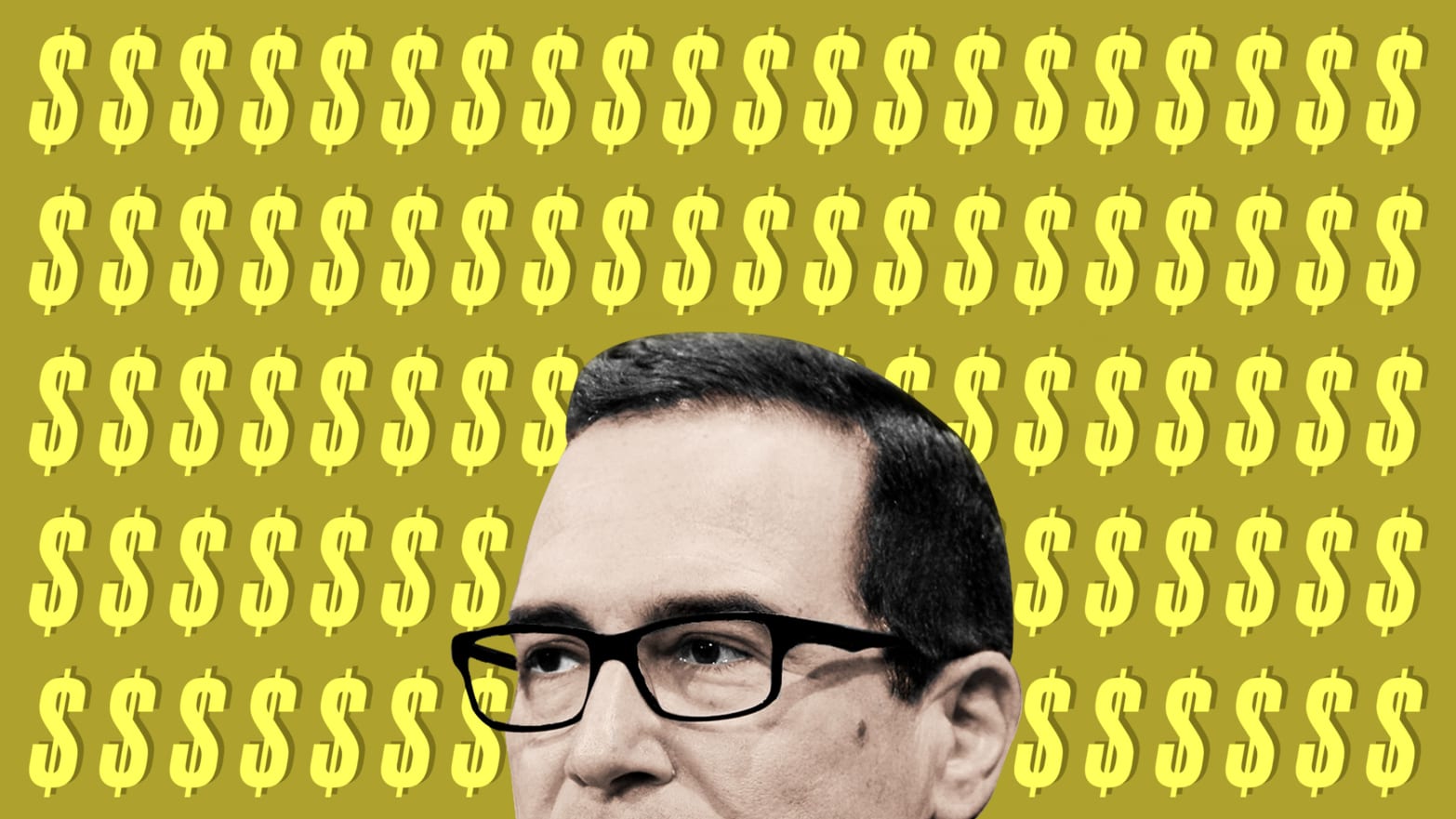Donald Trump and his top White House aide declare that the administration will not give the president's tax returns to Congress, as required under a 1924 anti-corruption law. But both the Treasury secretary and the tax commissioner have been much more nuanced, saying that they will obey the law even as they delay actually doing so.
I know why Treasury Secretary Steve Mnuchin and Charles Rettig, the IRS commissioner, are so cautious. They don’t want to be removed from office and sent to prison for five years just for doing Trump’s bidding.
The reason will no doubt surprise those who think Trump can thumb his nose at the law governing congressional access to anyone’s tax returns, including his. It will for sure shock Trump, who claims that "the law is 100 percent on my side."
The exact opposite is true.
Under Section 6103 of our tax code, Treasury officials “shall” turn over the tax returns “upon written request” of the chair of either congressional tax committee or the federal employee who runs Congress's Joint Committee on Taxation. No request has ever been refused, a host of former congressional tax aides tell me.
There is, however, a law requiring every federal “employee” who touches the tax system to do their duty or be removed from office.
The crystal-clear language of this law applies to Trump, acting White House Chief of Staff Mick Mulvaney, Mnuchin and Rettig, federal employees all.
The law says all of them "shall" be removed from office if they fail to comply with the request from Representative Richard Neal, the Massachusetts Democrat who chairs the House Ways and Means Committee.
There are no qualifiers in Section 6103 that shield Trump from delivering, in confidence, his tax returns to Congress. No wiggle room at all.
Another provision in our tax code, Section 7214(a), provides that “Any officer or employee of the United States acting in connection with any revenue law of the United States… who with intent to defeat the application of any provision of this title fails to perform any of the duties of his office or employment… shall be dismissed from office or discharged from employment and, upon conviction thereof, shall be fined not more than $10,000, or imprisoned not more than 5 years or both.”
All that Neal must do is make a request in writing that falls within the committee’s tax law and IRS oversight duties. Neal’s carefully articulated reasoning and requests for specific tax returns and related tax information in his April 3 letter easily meets that standard.
Congress earlier applied this law to Richard Nixon, who resigned in disgrace after a second audit of his returns showed he was a major league tax cheat. Nixon fabricated deductions worth more than $3.4 million in today’s money. Nixon got off with a pardon, while his tax lawyer went to prison.
The IRS had audited Nixon’s 1969 tax return but failed to catch major league cheating by the sitting president. Only when Congressional tax lawyers went over it, and the IRS did a second audit, did they spot blatant tax evasion.
Even if Mnuchin or Rettig or anyone else escaped prosecution for failing to provide the requested tax returns, removal from office under 7214(a) would damage and perhaps destroy their opportunities to cash in once they leave office.
Removal from office would require disclosures to future employers and investors, limit or block service on corporate boards and require disclosures to lenders. Even someone running a privately held company, as Trump still does, would be affected by heightened disclosure requirements.
Mnuchin, a former Goldman Sachs partner and savings and loan company chief executive, is only 56. Removal from office alone could mean an end to his big paydays in finance under existing regulations.
Rettig, 61, a tax lawyer whose specialty was helping wealthy tax dodgers who got caught in audits, could lose his California law license, especially were he to be convicted.
The good-conduct provisions of the tax law are as broad as they are severe. Significantly, it doesn’t just affect IRS auditors and collections officers. It applies to any federal employee—which means Trump as well as Mnuchin and Rettig—who “fails to perform any of the duties” they are assigned.
It also applies to any federal employee “who conspires or colludes with any other person to defraud the United States; or who makes opportunity for any person to defraud” the government. This provision could hit Mulvaney, the acting White House chief of staff and Trump’s budget director, given his reckless statements on Fox News, which some call Trump TV.
Should congressional tax lawyers, after examining Trump’s tax returns, finds that he is a tax cheat, anyone with knowledge of the cheating would also be at risk of prosecution.
Keep in mind that Trump lost two income tax fraud civil trials over his 1984 New York state and city tax returns, as recounted in my 2016 book The Making of Donald Trump.
He is also a confessed sales tax cheat, prompting Mayor Ed Koch of New York to say that Trump should have served 15 days behind bars for his crimes.
The law covers official inaction, too. Anyone who “omits” his duty “shall” be removed and may be prosecuted as a felon.
Section 7214 covers anyone with “knowledge or information of the violation of any revenue law by any person, or of fraud committed by any person, against the United States [who] under any revenue law, fails to report, in writing, such knowledge or information to the” Treasury secretary.
The risks to his liberty and fortune help explain why Mnuchin, while not turning over tax returns by the Wednesday deadline, told Congress this week, “as I've said in the past when we received the request, it would be reviewed by our legal department, and it is our intent to follow the law.”
That artful language was likely written by a government lawyer to help shield Mnuchin from removal from office and prosecution, at least for now.
Mnuchin can’t stall forever. If he or Rettig tries endless inaction, forcing House Democrats to sue in federal court, the failure to act could result in the same painful results as outright refusal to comply.
Under what is known as a “delegation order,” the responsibility for giving Congress tax returns upon written request has long been the duty of the IRS commissioner.
In testimony before the House Ways and Means Committee on Tuesday, Rettig said the decision on turning over the tax returns was his. He said he is “working on” a letter about what he will do. He also noted that he reports to Mnuchin since the IRS is under the umbrella of the Treasury Department.
One big problem for Rettig and Mnuchin, and perhaps others, is the provision requiring removal from office for anyone who “conspires or colludes with any other person.”
Mnuchin has acknowledged that Treasury officials talked with White House officials. And Rettig indicated he has spoken with Mnuchin and others at Treasury.
How many others were in the loop? Maybe Congressional hearings will tell us.
Johnston won a 2001 Pulitzer Prize for his coverage of the American tax system in The New York Times. He is the author of bestselling books on taxes and on Trump. He teaches at Syracuse University College of Law and is chief editor of the news service DCReport.org.

